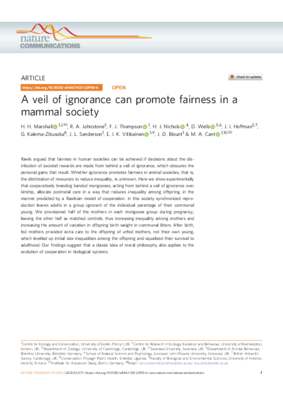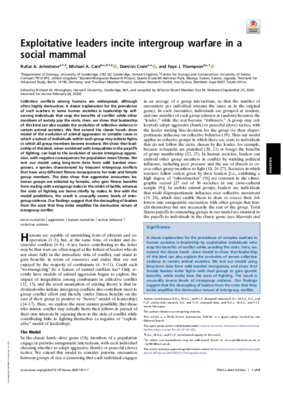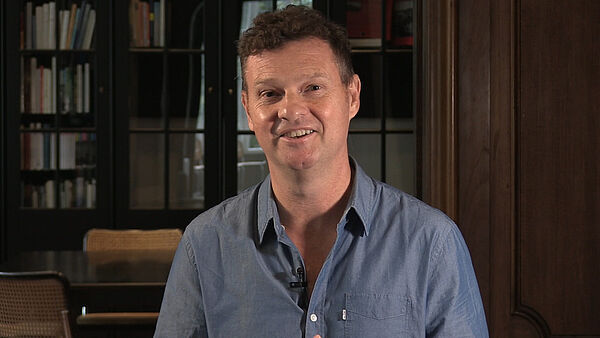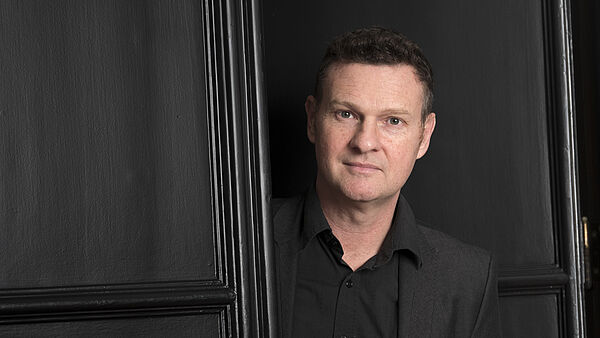
Michael Cant, Ph.D.
Professor of Evolutionary Biology
Universität Exeter
Born in 1971 in York, UK
Studied Zoology at the University of Newcastle-upon-Tyne and the University of Cambridge
Arbeitsvorhaben
War and Peace Since Life Began: Toward a Unified Evolutionary Theory of Intergroup Conflict
In humans, as in other social organisms, favouritism towards members of one's own group usually goes hand in hand with antipathy and/or aggression towards the members of other groups. Indeed, recent theory and data suggest that an evolutionary history of warfare may explain our remarkable patterns of cooperation and teamwork, even among non-relatives. In other social animals, there is great variation in the severity of intergroup conflict, and much variation between group members in contributions to fighting, for reasons that are poorly understood. Nevertheless, nature also shows that cooperation and peace among distinct groups is possible, as seen in "peaceful" primates, "chimeric" slime moulds, and cooperation between maternal and paternal genomes in diploid organisms. Evolutionary biology may offer new insights into modern and historical patterns of violence and discrimination, on the one hand, and intergroup cooperation, on the other. My project aims to identify the "ultimate" factors - genetic, ecological, social, cultural - that explain these varied patterns of peace and war across biological systems, using a combination of formal theory development and interdisciplinary comparative research.Recommended Reading
Thompson, F. J., M. A. Cant, H. H. Marshall, E. I. Vitikainen, J. L. Sanderson, H. J. Nichols, J. S. Gilchrist, et al. (2017). "Explaining negative kin discrimi-nation in a cooperative mammal society." PNAS 114, 20: 5207-5212.
Croft, D. P., R. A. Johnstone, S. Ellis, S. Nattrass, D. W. Franks, L. J. Brent, S. Mazzi, K. C. Balcomb, J. K. Ford, and M. A. Cant (2017). "Reproductive conflict and the evolution of menopause in killer whales." Current Biology 27, 2: 298-304.
Cant, M. A., and R. A. Johnstone (2008). "Reproductive conflict and the separa-tion of reproductive generations in humans." PNAS 105, 14: 5332-5336.
Kolloquium, 03.11.2020
Krieg und Frieden seit Anbeginn des Lebens: Auf dem Weg zu einer einheitlichen Evolutionstheorie des Intergruppenkonflikts
Eine der aufregendsten "großen Ideen" in der Biologie ist die Theorie der großen Übergänge in der Evolution biologischer Komplexität. Diese Theorie geht von der These aus, dass das uns bekannte Leben aus einer Reihe von großen Übergängen in der biologischen Organisation entstanden ist - Einheiten niederer Ebene verbanden sich, um sich zu Gruppen höherer Ebene zu formieren. Jeder dieser Übergänge brachte Möglichkeiten zur Differenzierung und Diversifizierung innerhalb einer Gruppe mit sich, aber auch das Potenzial für Konflikte und Gewalt zwischen den Gruppen. Je höher der erreichte Organisationsgrad ist, desto größer ist die Destruktivität der Konflikte, die zwischen den Einheiten dieser Ebene ausgetragen werden. In diesem Vortrag skizziere ich die Theorie der großen Übergänge in der Evolution und ihre Implikationen für die Evolution kooperativer Tiergesellschaften, wie sie sich beispielhaft an sozialen Insekten und Säugetieren zeigt, die sich kooperativ der Brutpflege widmen. Ich wende die Theorie auf eine Spezies - die Zebramanguste - an, die ich in einer Langzeitstudie untersuche, und lege dar, dass die entscheidenden Eigenschaften dieses Systems am besten als Anpassungen auf der Gruppenebene verstanden werden können; so werden Konflikte innerhalb der Gruppe unterdrückt und der Erfolg der Gruppe im Intergruppenwettbewerb erhöht. Zum Schluss erörtere ich die Ursachen der Variationen in den Intergruppenbeziehungen über verschiedene biologische Systeme hinweg und befasse mich mit der Frage, ob die Theorie der großen Übergänge ein nützliches Instrument bei der Erforschung menschlicher Konflikte sein könnte.
Publikationen aus der Fellowbibliothek
Cant, Michael (London, 2021)
A veil of ignorance can promote fairness in a mammal society
Cant, Michael (Cambridge, UK, 2021)
The evolution of social behaviour
Cant, Michael (New York, NY, Heidelberg, 2020)
Exploitative leaders incite intergroup warfare in a social mammal
Cant, Michael (London, 2018)
Decoupling of genetic and cultural inheritance in a wild mammal
Cant, Michael (London, 2017)
Reproductive conflict and the evolution of menopause in killer whales
Cant, Michael (Washington, DC, 2017)
Explaining negative kin discrimination in a cooperative mammal society
Cant, Michael (London, 2015)
Ecological knowledge, leadership, and the evolution of menopause in killer whales
Cant, Michael (Amsterdam, 2015)
The evolution of prolonged life after reproduction
Cant, Michael (Washington, DC, 2008)
Reproductive conflict and the separation of reproductive generations in humans




